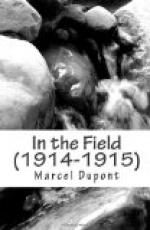Those who were at rest, lying close together at the bottom of the little dug-outs they had made for themselves in the bank, were sleeping or trying to sleep. More than one of them had succeeded, for resounding snores could be heard behind the blankets, pieces of tent canvas and sacking, and all the various rags with which they had ingeniously stuffed up the entrances to their rustic alcoves. One wondered how they could have overcome the sufferings the cold must have caused them so far as to be able to sleep calmly. The five months of war had hardened their bodies and accustomed them to face cold, heat, rain, dust, or mud, with impunity. In this hard school, better than in any other, men of iron are fashioned, who last out a whole campaign and are capable of the supreme effort when the hour comes.
We arrived at the Territorials’ trench.
“Bon-soir, mon cher camarade.”
It was the Second-Lieutenant whom I met at the entrance. He was a man of forty-two, thin, pale, and bearded. In the shadow his eyes shone strangely. Under the skirts of his great-coat he had his hands buried in his trouser pockets. His elbows stuck out from his body, his knees were bent, his teeth chattered, and he was gently knocking his heels together.
“It isn’t warm, eh?” I asked.
“Oh, no; and then, you see, this sort of work is hardly the thing for fellows of our age. Our blood isn’t warm enough, and, however you cover yourself up, there’s always a chink by which the cold gets in. The worst of all is one’s hands and feet; and there’s nothing to be done for it. Wouldn’t it be much better to trust to us, give us the order to fix bayonets and drive those Boches out of their trenches over there? You’d see if the Territorials couldn’t do it as well as the Regulars.... And then one would have a chance of getting warm.”
I felt sure that he spoke the truth, and that his opinion was shared by the majority of his companions. But our good comrades of the Territorial Force have no conception of the vigour, the suppleness, and of the fulness of youth required to charge up to the enemy’s line under concentrated fire and to cut the complex network of barbed wire that bars the road. Our chiefs were well advised in placing these troops where they were, in those lines of trenches scientifically constructed and protected, where their courage and tenacity would be invaluable in case of attack, and where they would know better than any others how to carry out the orders given to us: “Hold on till death.” Leave to the young soldiers the sublime and perilous task of rushing upon the enemy when he is hidden behind the shelter of his fougades, his parapets, and his artificial brambles; and entrust to the brave Territorials the more obscure but not less glorious work of mounting guard along our front.




